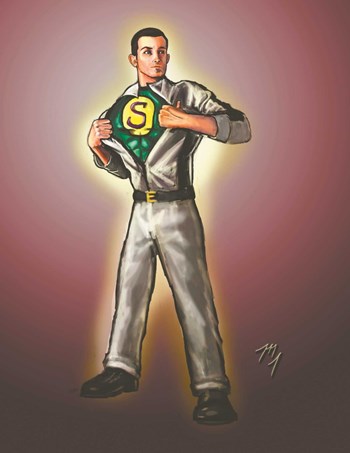
The life of a super is different every day, but it usually goes something like this: arrive at work each morning; check in with security for any possible situations that have come up during the night; review any outstanding work orders and walks the property, making sure that all of the building mechanicals—such as the cooling towers, boilers, pool, etc.—are all running properly; if anything is wrong, log in the problems. Then, meet with staff, divide the work orders for the daily and holds daily, weekly, and monthly meetings to follow up and make sure everything is running smoothly.
In the past, the responsibilities of a building super or chief engineer could have been described as ‘it’s a dirty job, but somebody has to do it.” Building superintendents get their hands dirty from time to time, but nothing compared to the way job was 20 years ago. Think back to how the building or chief engineers, also known as ‘supers’ or ‘resident managers’ in some parts of the country—were portrayed on television or in movies. They were the guys with the huge crowded key ring who were greased up and dirty from the repairs they made. Remember Schneider from “One Day at a Time?” He didn’t really have authority to do more than basic repairs (although Schneider was a special case). Oh, how times have changed.
Today, the role of the super has evolved, and it’s also become more varied. “I’m the first person in, and the person that’s here every day. I deal with the majority of the owners and the trustees because I’m at the site. I’m here first-hand. All contractors go through me on a daily basis,” says Michael Tucker, the superintendent at Crossroads on the Charles in Watertown, Massachusetts, who works for First Realty Management.
A super in one building could have a different combination of responsibilities than the person with the same title down the street. Commonly, supers are responsible for maintaining high-rise condominiums and property grounds, including all building systems, including elevators, fire alarms, fire pumps, sprinklers, emergency generators, electrical, domestic water, boilers, irrigation, HVAC systems and all associated equipment, swimming pools and Jacuzzis, gym equipment and health club amenities. They are also responsible for inspections and repairs as needed, working with vendors and hiring and training maintenance personnel. “Things out of place, making sure the dumpster’s been emptied, making sure the cleaning crew did their job properly. It’s also general upkeep and safety inspections,” says Lance LaValle, a superintendent and maintenance contractor based in Worcester, Massachusetts.
Qualifications
Defining the perfect candidate for the job of a building super or engineer is almost an impossible task; since every building is different, the kind of person needed will be different.
There’s no formal benchmark for supers when it comes to qualifications for the job. Some might have a college background in engineering. while others might have extensive experience in building maintenance or construction. “I would say you need some experience in the maintenance field,” says Tucker. “I would think it also depends on the jobs that will be needed for that specific site: carpentry, painting, plumbing. This site is more about overseeing construction. But on a daily basis I need to have knowledge of carpentry, plumbing—you name it,” he says.
Supers also need to know their role and how it fits in with the other layers of building maintenance. They need to be vigilant and know the intricacies of buildings that only someone who’s there every day can notice, but they also need to know when a project is too big. “It’s being able to know your limits, and know what’s more than you can handle. It’s also cost and time effective. A lot I can do myself, but you bring a crew in and they can knock it out really fast so it doesn’t inconvenience the residents. To tile the lobby, I could do it all myself in a week, but you bring a crew in, and they’re out in two days,” says LaValle.
Supers also have somewhat of a thankless job in the schematic of responsibilities of the upkeep of a building. Supers don’t score the winning goal, or make the big tackle, but they’re constantly responding to the building, setting those blocks, to continue the sports metaphor—doing the little things that doesn’t get much of the glory. “Being in this field for so long, I’ve had major floods, fire sprinklers go off. The trick is you have to be proactive, so that these things don’t happen,” says Tucker. “One of the things is knowing the building that you’re working at. Where shut-offs are. When I go through a property with a new super or a maintenance person, one of the first things we do on the property is to understand where shut-offs are, electrical panels, knowing how to contact fire departments, police departments.”
Supers or building engineers should also be able to adapt their personalities based on the situation, especially since they will encounter very strange or demanding situations. “Communication is definitely a key when dealing with owners in a condominium complex. Keeping them up to date on what’s going on when it comes to the board of trustees and management. And being responsive to them when they have questions,” says Tucker.
Part of the thankless work is also using those necessary communication skills to make sure unit owners are being responsible with their property so it’s not affecting the well-being of the building.
“I think people don’t realize how nice you have to be when people are being very rude. If something’s wrong and they’re upset, you have to try to explain the situation, and sometimes they just don’t hear it,” says LaValle. His example: “We had a unit where the bathtub drain was leaking. The person who had the leak didn’t see it, and we kept telling him he needed to fix it. It kept leaking to the condo below, and it totally destroyed the ceiling. He took so long—it came to the point where we had to turn his water off. He ended up having to pay to repair the whole ceiling, which he wasn’t too happy about, but we tried to explain what happened,” says LaValle.
Union or Not?
A lot of superintendents in New England, most of them based in large metropolitan areas, are affiliated with property management companies. Most management company employees do not belong to a union. For those that do in New England, there is a SEIU Local 32BJ chapter in Connecticut with offices in Hartford, New Haven and Stamford. Local 32BJ is the largest union of property service workers in the U.S, including janitors, property maintenance workers, doormen, security officers, window cleaners, building engineers, and school and food service workers. There are over 145,000 members of 32BJ.
Workers have their own training fund, a joint labor-management partnership that offers training to eligible participants at no cost. According to 32BJ, members are concentrated mostly in the Northeast— in Massachusetts, New Hampshire, Rhode Island, Connecticut, New Jersey, New York, Delaware, Pennsylvania, Maryland, Northern Virginia, and Washington, D.C.—but the union’s reach extends to southern Florida.
“In some cases non-union workers get a better deal, but those are rare cases,” says Peter Grech, a resident manager in New York, who is also a member and Director of Education for Local 32BJ. “The majority of non-union makes a little less money than union employees, but the responsibilities are no different.”
Getting Training
If someone wants to be a super or building engineer, they often start their careers as a doorman or porter and work their way up taking classes to accelerate their knowledge.
Property management companies and the union provide training in academics, computer instruction, and major aspects of the management and building services business.
Since there’s typically no bachelor’s degree for supers or building engineers, there are a slew of certifications and courses that many buildings require or look for. “Most people do go through certifications with either the Institute of Real Estate Management or New England Affordable Housing Management Association. The training that you take there is great for any type of managing of properties,” says Tucker.
NEAHMA, for example offers courses in valuable subjects other than the trades. The organization covers issues like discrimination laws, federal laws on housing from the Department of Housing and Urban Development, and finances related to housing. “A super needs to be someone who’s willing to learn, because it’s a daily learning experience, being a super. No day is the same. So you have to be willing to learn new things on a daily basis, and have an open mind, be energetic. It’s not a type of job where you can sit back,” says Tucker.
Gone are the days of the Duane Schneiders (“One Day at a Time”) and Nathan Bookmans (“Good Times”) of the past. In today’s world, supers have much more responsibility, including supervision of staff, reporting and other administrative duties. As one New York superintendent once said, “Gone are the days of the old janitor, tool pouch and key ring. Today, a resident manager only has three keys—one to the office, a master key for the apartments and a key to his own apartment.”
Lisa Iannucci is a freelance writer and a frequent contributor to New England Condominium. Editorial Assistant Tom Lisi contributed to this article.






Leave a Comment